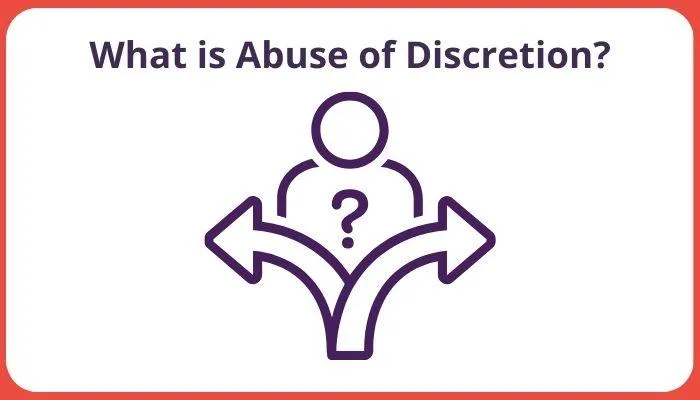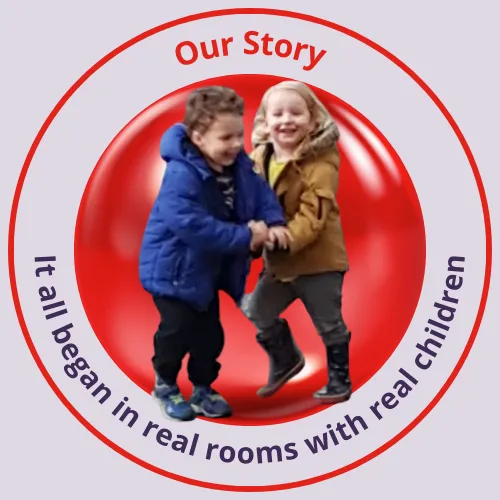Every child's well-being matters.
Best Practice Ideas for Safeguarding Articles
Quick Access

What is Abuse of Discretion?
Custom HTML/CSS/JAVASCRIPT
Abuse of discretion in the early years can occur when authorities or decision-makers, such as government agencies, schools, child protection services, or family courts, act in ways that are unreasonable or contrary to legal standards when making decisions about a child's welfare, education, or care.
If flawed or arbitrary, these decisions can have serious long-term consequences on a child's development, well-being, and future prospects.
Often, when a safeguarding incident has occurred, the following investigation reveals abuse of discretion leading up to the event.
Here's how abuse of discretion can manifest and affect early childhood:
Child Welfare and Protection:
Abuse of discretion in child welfare cases often involves social workers or child protection agencies acting unreasonably in decisions regarding custody, removal from homes, or placement in foster care.
If a child is removed from their home without proper justification, or if appropriate procedures aren't followed, it could be considered an abuse of discretion. This can cause trauma, disrupt emotional development, and impair attachment relationships.
Conversely, failing to remove a child from an unsafe or abusive home due to an arbitrary or negligent decision can leave the child at risk of further harm.
Family Court and Custody Decisions:
Judges in family courts make decisions about custody, visitation rights, and parental responsibilities. If a judge makes these decisions without considering critical evidence or following proper legal procedures, this could be seen as an abuse of discretion.
Incorrect or arbitrary custody rulings can disrupt a child's sense of security and stability, affecting their emotional and social development, especially during critical early years.
For instance, if a parent with a history of abuse or neglect is granted custody due to a judge's improper decision-making, the child's safety and well-being could be severely compromised.
Education and Early Childhood Services:
Abuse of discretion can also appear in educational settings, where school authorities or early childhood educators make unreasonable decisions regarding a child's academic needs, support services, or disciplinary actions.
Suppose a child with special needs is denied access to essential services (like early intervention programs or Individualised Education Programs) due to arbitrary or improper decisions. In that case, their development might be hindered, leading to long-term educational deficits.
Excessive or disproportionate disciplinary measures taken against young children without considering alternatives or proper evaluation of the circumstances can also be seen as an abuse of discretion. This can negatively affect a child's emotional and cognitive development.
Health and Medical Decisions:
Abuse of discretion can occur when health agencies or medical professionals make unreasonable decisions regarding a child's healthcare. For instance, denying necessary medical treatments or therapies, especially for children with disabilities or chronic conditions, can hinder a child's development.
Suppose authorities or courts intervene in medical decisions for a child in a way that ignores medical evidence or expert recommendations. In that case, it can have a lasting impact on the child's health.
Impact on Development:
The early years (0–5) are crucial for brain development, emotional attachment, and social skills. Any decisions that disrupt the stability and security of a child's environment during this period can lead to developmental delays, behavioural issues, and emotional challenges.
Arbitrary or unreasonable decisions, such as inappropriate placements in foster care, poor educational support, or improper medical treatment, can lead to long-term effects on the child's intellectual and emotional growth.
Legal Recourse and Remedies:
Families affected by abuse of discretion in early childhood can appeal decisions or seek legal remedies. Appellate courts can review whether discretion was abused in family court rulings, child protective cases, or other administrative decisions involving children.
Overturning or correcting these decisions may help remedy some of the adverse effects, although it often takes time and can be challenging to reverse developmental harm already caused.
Examples of Potential Effects:
Mental and Emotional Health: Erratic decision-making can lead to instability, which might cause anxiety, depression, attachment disorders, or other emotional challenges in children.
Education Gaps: Failing to provide appropriate early educational services, like special education, could lead to a child falling behind their peers and experiencing long-term academic challenges.
Social Development: Frequent changes in caregivers or inappropriate disciplinary measures can interfere with a child's ability to develop trust and social skills, impacting relationships later in life.
In summary, abuse of discretion in the early years can have lasting, often detrimental, effects on a child's immediate well-being and long-term development.
Safeguards and proper judicial oversight are crucial in ensuring decisions made in these formative years are reasonable, lawful, and in the child's best interest.
Would you know what to do if you suspect a decision hasn't been made properly, with the best interests of the child at it's centre?
AUTHOR:- Iona has nearly 10 years of experience supporting nurseries and childminders in curriculum planning, leadership, and safeguarding. Her writing is informed by public information and sector insight, aiming to provide accessible, practical support for professionals working with children. She is part of the On the Button team, helping deliver Well-being, Safeguarding and Complaint Management Software that empowers practitioners to identify concerns early and act confidently.
On the Button provides innovative software tailored to the needs of the early years sector, with a strong focus on EYFS well-being and early years safeguarding. Our tools help senior practitioners to confidently track concerns, maintain robust records, and respond effectively — all while meeting statutory guidance. From early years complaint management to team-wide safeguarding alerts, our platform puts children's safety and emotional health first.
Quick Access

What is Abuse of Discretion?
Custom HTML/CSS/JAVASCRIPT
Abuse of discretion in the early years can occur when authorities or decision-makers, such as government agencies, schools, child protection services, or family courts, act in ways that are unreasonable or contrary to legal standards when making decisions about a child's welfare, education, or care.
If flawed or arbitrary, these decisions can have serious long-term consequences on a child's development, well-being, and future prospects.
Often, when a safeguarding incident has occurred, the following investigation reveals abuse of discretion leading up to the event.
Here's how abuse of discretion can manifest and affect early childhood:
Child Welfare and Protection:
Abuse of discretion in child welfare cases often involves social workers or child protection agencies acting unreasonably in decisions regarding custody, removal from homes, or placement in foster care.
If a child is removed from their home without proper justification, or if appropriate procedures aren't followed, it could be considered an abuse of discretion. This can cause trauma, disrupt emotional development, and impair attachment relationships.
Conversely, failing to remove a child from an unsafe or abusive home due to an arbitrary or negligent decision can leave the child at risk of further harm.
Family Court and Custody Decisions:
Judges in family courts make decisions about custody, visitation rights, and parental responsibilities. If a judge makes these decisions without considering critical evidence or following proper legal procedures, this could be seen as an abuse of discretion.
Incorrect or arbitrary custody rulings can disrupt a child's sense of security and stability, affecting their emotional and social development, especially during critical early years.
For instance, if a parent with a history of abuse or neglect is granted custody due to a judge's improper decision-making, the child's safety and well-being could be severely compromised.
Education and Early Childhood Services:
Abuse of discretion can also appear in educational settings, where school authorities or early childhood educators make unreasonable decisions regarding a child's academic needs, support services, or disciplinary actions.
Suppose a child with special needs is denied access to essential services (like early intervention programs or Individualised Education Programs) due to arbitrary or improper decisions. In that case, their development might be hindered, leading to long-term educational deficits.
Excessive or disproportionate disciplinary measures taken against young children without considering alternatives or proper evaluation of the circumstances can also be seen as an abuse of discretion. This can negatively affect a child's emotional and cognitive development.
Health and Medical Decisions:
Abuse of discretion can occur when health agencies or medical professionals make unreasonable decisions regarding a child's healthcare. For instance, denying necessary medical treatments or therapies, especially for children with disabilities or chronic conditions, can hinder a child's development.
Suppose authorities or courts intervene in medical decisions for a child in a way that ignores medical evidence or expert recommendations. In that case, it can have a lasting impact on the child's health.
Impact on Development:
The early years (0–5) are crucial for brain development, emotional attachment, and social skills. Any decisions that disrupt the stability and security of a child's environment during this period can lead to developmental delays, behavioural issues, and emotional challenges.
Arbitrary or unreasonable decisions, such as inappropriate placements in foster care, poor educational support, or improper medical treatment, can lead to long-term effects on the child's intellectual and emotional growth.
Legal Recourse and Remedies:
Families affected by abuse of discretion in early childhood can appeal decisions or seek legal remedies. Appellate courts can review whether discretion was abused in family court rulings, child protective cases, or other administrative decisions involving children.
Overturning or correcting these decisions may help remedy some of the adverse effects, although it often takes time and can be challenging to reverse developmental harm already caused.
Examples of Potential Effects:
Mental and Emotional Health: Erratic decision-making can lead to instability, which might cause anxiety, depression, attachment disorders, or other emotional challenges in children.
Education Gaps: Failing to provide appropriate early educational services, like special education, could lead to a child falling behind their peers and experiencing long-term academic challenges.
Social Development: Frequent changes in caregivers or inappropriate disciplinary measures can interfere with a child's ability to develop trust and social skills, impacting relationships later in life.
In summary, abuse of discretion in the early years can have lasting, often detrimental, effects on a child's immediate well-being and long-term development.
Safeguards and proper judicial oversight are crucial in ensuring decisions made in these formative years are reasonable, lawful, and in the child's best interest.
Would you know what to do if you suspect a decision hasn't been made properly, with the best interests of the child at it's centre?
AUTHOR:- Iona has nearly 10 years of experience supporting nurseries and childminders in curriculum planning, leadership, and safeguarding. Her writing is informed by public information and sector insight, aiming to provide accessible, practical support for professionals working with children. She is part of the On the Button team, helping deliver Well-being, Safeguarding and Complaint Management Software that empowers practitioners to identify concerns early and act confidently.
On the Button provides innovative software tailored to the needs of the early years sector, with a strong focus on EYFS well-being and early years safeguarding. Our tools help senior practitioners to confidently track concerns, maintain robust records, and respond effectively — all while meeting statutory guidance. From early years complaint management to team-wide safeguarding alerts, our platform puts children's safety and emotional health first.

What is Abuse of Discretion?
Custom HTML/CSS/JAVASCRIPT
Abuse of discretion in the early years can occur when authorities or decision-makers, such as government agencies, schools, child protection services, or family courts, act in ways that are unreasonable or contrary to legal standards when making decisions about a child's welfare, education, or care.
If flawed or arbitrary, these decisions can have serious long-term consequences on a child's development, well-being, and future prospects.
Often, when a safeguarding incident has occurred, the following investigation reveals abuse of discretion leading up to the event.
Here's how abuse of discretion can manifest and affect early childhood:
Child Welfare and Protection:
Abuse of discretion in child welfare cases often involves social workers or child protection agencies acting unreasonably in decisions regarding custody, removal from homes, or placement in foster care.
If a child is removed from their home without proper justification, or if appropriate procedures aren't followed, it could be considered an abuse of discretion. This can cause trauma, disrupt emotional development, and impair attachment relationships.
Conversely, failing to remove a child from an unsafe or abusive home due to an arbitrary or negligent decision can leave the child at risk of further harm.
Family Court and Custody Decisions:
Judges in family courts make decisions about custody, visitation rights, and parental responsibilities. If a judge makes these decisions without considering critical evidence or following proper legal procedures, this could be seen as an abuse of discretion.
Incorrect or arbitrary custody rulings can disrupt a child's sense of security and stability, affecting their emotional and social development, especially during critical early years.
For instance, if a parent with a history of abuse or neglect is granted custody due to a judge's improper decision-making, the child's safety and well-being could be severely compromised.
Education and Early Childhood Services:
Abuse of discretion can also appear in educational settings, where school authorities or early childhood educators make unreasonable decisions regarding a child's academic needs, support services, or disciplinary actions.
Suppose a child with special needs is denied access to essential services (like early intervention programs or Individualised Education Programs) due to arbitrary or improper decisions. In that case, their development might be hindered, leading to long-term educational deficits.
Excessive or disproportionate disciplinary measures taken against young children without considering alternatives or proper evaluation of the circumstances can also be seen as an abuse of discretion. This can negatively affect a child's emotional and cognitive development.
Health and Medical Decisions:
Abuse of discretion can occur when health agencies or medical professionals make unreasonable decisions regarding a child's healthcare. For instance, denying necessary medical treatments or therapies, especially for children with disabilities or chronic conditions, can hinder a child's development.
Suppose authorities or courts intervene in medical decisions for a child in a way that ignores medical evidence or expert recommendations. In that case, it can have a lasting impact on the child's health.
Impact on Development:
The early years (0–5) are crucial for brain development, emotional attachment, and social skills. Any decisions that disrupt the stability and security of a child's environment during this period can lead to developmental delays, behavioural issues, and emotional challenges.
Arbitrary or unreasonable decisions, such as inappropriate placements in foster care, poor educational support, or improper medical treatment, can lead to long-term effects on the child's intellectual and emotional growth.
Legal Recourse and Remedies:
Families affected by abuse of discretion in early childhood can appeal decisions or seek legal remedies. Appellate courts can review whether discretion was abused in family court rulings, child protective cases, or other administrative decisions involving children.
Overturning or correcting these decisions may help remedy some of the adverse effects, although it often takes time and can be challenging to reverse developmental harm already caused.
Examples of Potential Effects:
Mental and Emotional Health: Erratic decision-making can lead to instability, which might cause anxiety, depression, attachment disorders, or other emotional challenges in children.
Education Gaps: Failing to provide appropriate early educational services, like special education, could lead to a child falling behind their peers and experiencing long-term academic challenges.
Social Development: Frequent changes in caregivers or inappropriate disciplinary measures can interfere with a child's ability to develop trust and social skills, impacting relationships later in life.
In summary, abuse of discretion in the early years can have lasting, often detrimental, effects on a child's immediate well-being and long-term development.
Safeguards and proper judicial oversight are crucial in ensuring decisions made in these formative years are reasonable, lawful, and in the child's best interest.
Would you know what to do if you suspect a decision hasn't been made properly, with the best interests of the child at it's centre?
AUTHOR:- Iona has nearly 10 years of experience supporting nurseries and childminders in curriculum planning, leadership, and safeguarding. Her writing is informed by public information and sector insight, aiming to provide accessible, practical support for professionals working with children. She is part of the On the Button team, helping deliver Well-being, Safeguarding and Complaint Management Software that empowers practitioners to identify concerns early and act confidently.
On the Button provides innovative software tailored to the needs of the early years sector, with a strong focus on EYFS well-being and early years safeguarding. Our tools help senior practitioners to confidently track concerns, maintain robust records, and respond effectively — all while meeting statutory guidance. From early years complaint management to team-wide safeguarding alerts, our platform puts children's safety and emotional health first.


